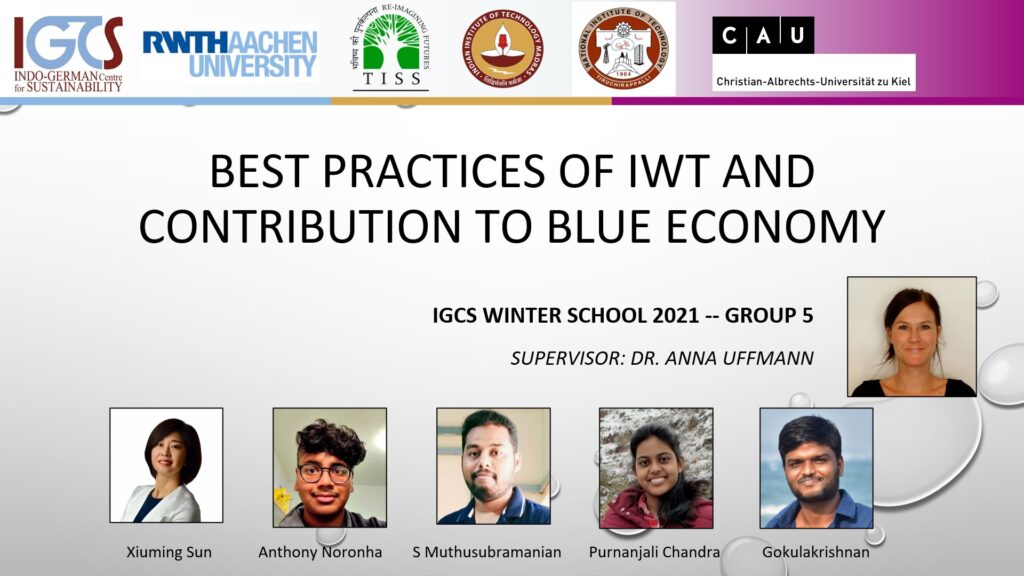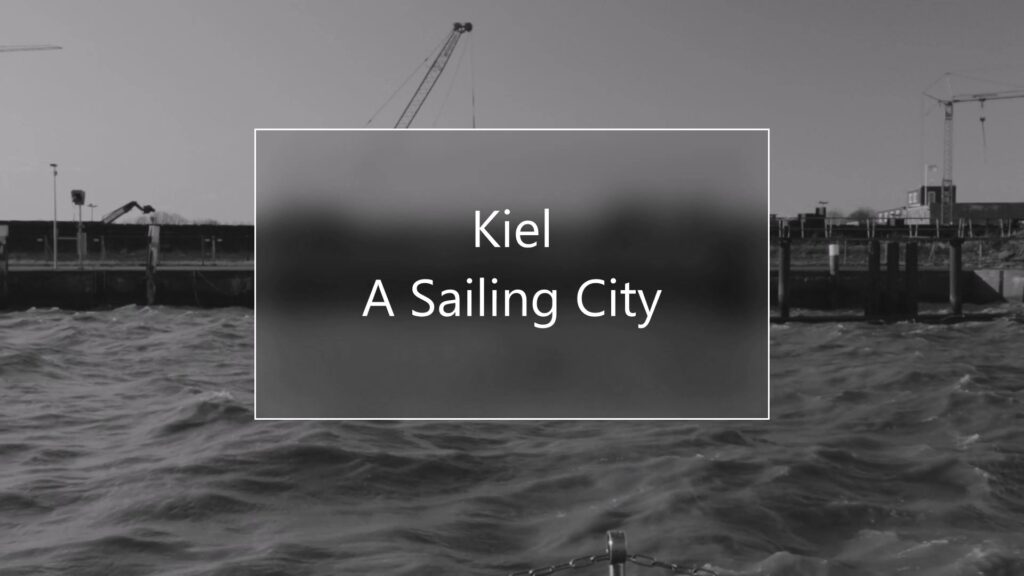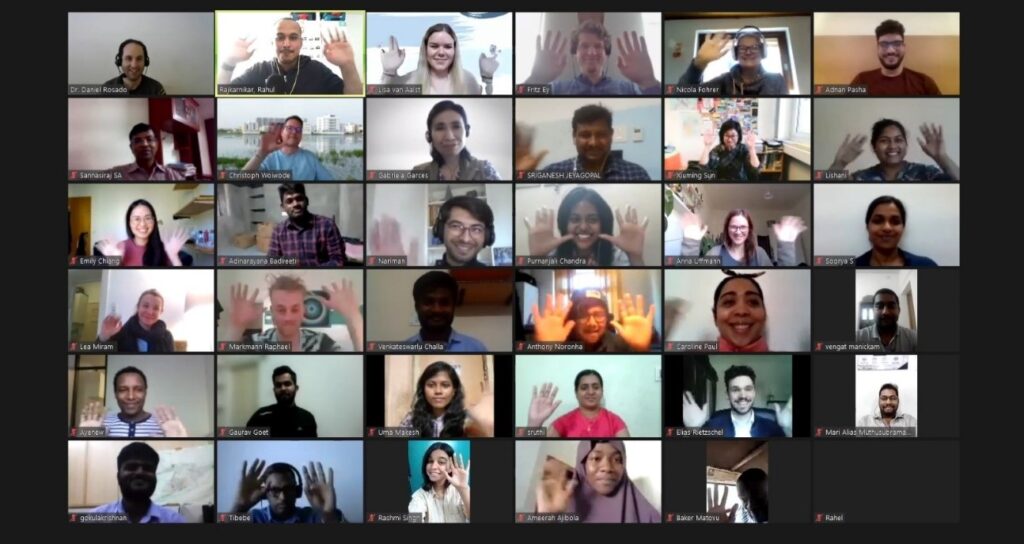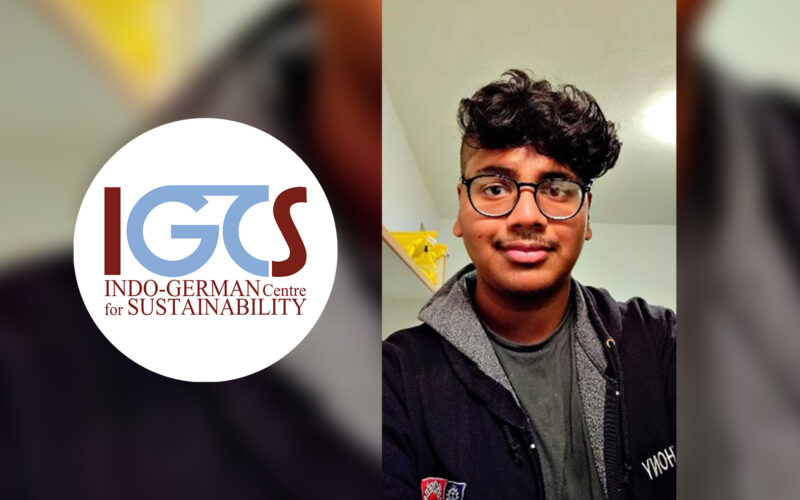The past year has been a difficult time for everyone around the world because of the ongoing pandemic. During this time, among many other things, education came to a standstill. I was one of the many who found themselves in this whirlwind. The world took some time to catch up, but eventually, it got there. Online learning became a global phenomenon. With all things functioning over the internet, the education sector found a comfortable niche as well. Slowly scientific lectures, seminars, and conferences being held on online platforms became the new normal. During this time, at the beginning of the winter semester last year, I discovered this IGCS winter school 2021 through the department of hydrology at Kiel University, Germany, where I am enrolled in the Environmental Management Master’s program. My affinity towards the winter school’s topic of “Sustainable Inland Waterway Transportation” (IWT) for a Blue Economy comes as no surprise as I was born very close to the sea. I hail from Mumbai, a major port city on the western coast of India and a city that never sleeps, especially when it comes to trade via the waterways. I browsed through the IGCS website to see what I was signing up for before sending in my application, and I fell in love with their winter and summer schools concept. I saw that they had recently held a summer school online, which was a total success considering the times it was held in. This school’s multicultural and interdisciplinary approach put a nail in my decision to attend this Winter School.
I applied for the school in late December 2020 and received the acceptance email in mid-January. The school took place from the 22nd of February 2021 to the 5th of March 2021. This Winter School attempted to look into the developmental initiatives, issues, and challenges, improving IWT infrastructure and operations to further strengthen the IWT sector. It brought together about 30 international students from the Indian and German academic institutions who jointly and interactively developed their skills with respect, for instance, to understand the systemic nature of IWT activities, identifying the challenges and issues in IWT – special reference to channel maintenance and navigation, recognizing sustainability issues associated with IWT transport – Strengthening public-private partnership, understanding the systemic nature of urban transport activities, and developing ideas on ‘smart technology’ solutions.
On the first day of the Winter School, we had an introductory session where the whole IGCS organizing team from both sides – German and Indian, introduced themselves. The center coordinators started with their brief introduction, and then the focus area coordinators took the stage to introduce themselves. The event coordinators from RWTH Aachen and Kiel University gave us a warm welcome talk. This whole session marked the beginning of the IGCS Winter School 2021. The IGCS video was played to the entire group. We, the participants, then moved on, introducing ourselves to the whole group. We took our conversations to a chat-based platform thereafter, where we had the freedom to express more informally. I think this helped everyone gel better with the whole group and for everyone to feel at ease. On the second day, in the afternoon session, we had intercultural activities planned for us by the organizing team that included breakout rooms where students from both sides got to chat and bond a bit in smaller groups. We also indulged in an intercultural quiz and survey (on the platform called “menti-meter”), which helped us bond better in a more formal setting.
The Winter School lasted for 2 weeks and was majorly divided into 3 segments. The first segment included seminars and lectures from professionals from this domain. We had 11 different speakers who spoke about various aspects of the IWT sector throughout the school. They talked about the scientific aspect with regards to IWT, how it affects the surrounding ecosystems, what measures can be taken to mitigate climate change from a government point of view, and the different technological advancements that are used and that can be implemented soon for IWT’s smooth functioning. The second segment was made up of panel discussions. There were 3 of them during the Winter School that included different panelists with different backgrounds that brought a unique perspective to the panel discussions. I thoroughly enjoyed the panel discussion where we spoke about the impact of the recently ongoing COVID-19 pandemic on the Blue Economy. The third segment of the Winter School was the working group/group project. The outcome of which was to make a presentation of our findings at the end of the school. The participants were divided into 6 working groups. Each group was assigned with one supervisor who would guide the group during the 5 group sessions that were allotted. Each group had about 4-5 group members. On the last day of the Winter School, each working group had to present their findings in the form of a presentation, which should have lasted for roughly about 20-30 minutes. The audience had a chance to question the working group after their production as well. After all the presentations on the last day of the Winter School, we had the last feedback. The final remarks were given by the IGCS Winter School organizing team.

I enjoyed many activities throughout this Winter school. Mainly, the one activity that I have never come across in any other schools that I have been a part of, and I would see more of it in future schools, is the weekend activity session of making videos. As part of this activity, we were asked to make videos of our surrounding areas, especially water bodies and the activities in them. As a secondary part, we were also asked to capture the cultural aspects observed in our surroundings, which brings out the intercultural aspect of this IGCS Winter School when shown to the whole groups.

The format of this digital school was well planned and very well executed. The duration of the school was perfect, in my opinion, to achieve the right depth in the topic of the school – not too deep to be a narrowed study/domain topic, and not too shallow to be a one-off seminar talk. I am not only going to give positive recommendations to fellow students who plan to attend future IGCS schools but also going to convince a lot of them to take it up as a good experience in the first place. It is not every day that a chance like this comes in hand to be part of a school with such an intercultural and an interdisciplinary approach deeply rooted to the core. A student attending a school like this, especially during these times, is surely going to have a lot of learning coupled with fun and interactive sessions that would make the time invested in it.
Despite the physical restrictions, the Winter School was a success. It allowed participants to gain an international experience without stepping a foot out in the real world. In addition to its multicultural working environment, the Winter School presented a different challenge of understanding the novelty of online learning in interdisciplinary collaboration. Overall, the Winter School presented an exciting model of how digital communication platforms can interact and reach people beyond what was possible through conventional means. A lot of learning has been done on both sides throughout this school. It leaves a lot of dwelling upon for the participants and the organizers to take away from this school. I had a great time being part of this IGCS event, and I will take part in the next one. In all honestly, I would like to take advantage of the opportunities that the IGCS has laid out for us. A big thank you to the entire IGCS Winter School 2021 organizing team and everyone from IIT Madras, RWTH Aachen University, and Kiel University. They were part of it in making this event a huge success. A special thanks to the funding institute German Academic Exchange Service (DAAD) through its program ‘A new Passage to India,’ without whose help this event would not have been made possible.

Anthony Noronha

